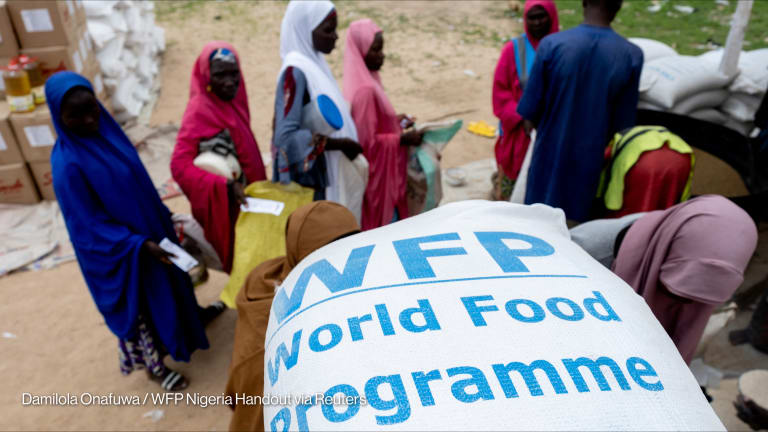
A coalition of civil society representatives is rejecting guidelines for food systems reform that were recently adopted by the United Nations Committee on World Food Security, or CFS, over what they say is undue corporate influence in global efforts to remake how the world grows, transports, and distributes nutritious food to feed a growing population.
The group’s position echoes similar concerns it has surrounding the upcoming U.N. Food Systems Summit.
CFS is an intergovernmental platform responsible for developing and endorsing global policy recommendations and guidance on food security and nutrition. Its member states approved the Voluntary Guidelines on Food Systems and Nutrition through consensus at their 47th session in February.
The document contains 105 recommendations for how food systems should operate to reduce malnutrition and help the world meet related Sustainable Development Goals by 2030.
Part of our The Future of Food Systems series
Find out how we can make food fair and healthy for all. Join the conversation using the hashtag #FoodSystems and visit our The Future of Food Systems page for more coverage.
During deliberations at the February meetings, the Civil Society and Indigenous People’s Mechanism, or CSM, expressed dissatisfaction with the document as negotiated. Last week, they released a formal policy position rejecting the guidelines, which member states are not legally bound to implement.
“It is not with easiness that the CSM expresses its disappointment and disheartenment vis-à-vis the outcomes and the deviation of this policy convergence process. The Guidelines fail to meet the ambition, mandate, and aspirations that this process should have had. They are far from the CSM expectations and priorities and could even undermine progress achieved so far,” CSM wrote.
“Despite currently being in the midst of a health and planetary crisis, they fail to give guidance for the transformation of food systems that is needed to address this crisis on top of pre-existing ones, and which negatively affect the lives of so many while benefiting only a few.”
Following a request for comment, CSM did not make a representative available to discuss the group’s concerns.
In documents detailing its position, CSM said “almost all our priorities are not represented in the guidelines.” The guidelines include no acknowledgment of the role of industrial food systems, no emphasis on sustainability, no acknowledgment of human rights as a pillar of food systems transformation, and no focus on agroecology.
CFS Secretary Chris Hegadorn said CSM’s perspective was taken into account during the six regional consultations CFS held to get feedback on the guideline draft. He sees the guidelines as a “glass half full” moment, as it is the first time agriculture has been formally linked to other key sectors such as health, environment, labor, and human rights.
“This is a huge accomplishment, a culmination of five-plus years of work, a very inclusive global process — and all parties were included. At the end of the day, this was where states were willing to come out. This was the global convergence point amongst the members and you have to know that CFS members means member states,” Hegadorn said.
“The global convergence point is where all of our products end up. Imperfect as they may be, that is where governments are willing to meet and join consensus. And so for us and for the secretariat, the hard work has just begun.”
CSM objected to the virtual nature of the negotiations, which took place on Zoom because the pandemic prevented representatives from gathering in Rome where CFS is hosted at the U.N. Food and Agriculture Organization.
CSM representatives argued virtual negotiations would exclude some of their members who were not able to get online, and delayed the process until September. That left CFS member states less time to agree on the final text before the guidelines were to be adopted at the February meeting.
Hegadorn said he wants to encourage CSM to see the guidelines as “an opportunity” to overhaul food systems and join CFS in promoting their implementation, which has to be done by governments on a national and local level. He noted that while CSM has four representatives on the CFS non-state advisory group, the private sector only has one.
“[The Private Sector Mechanism] is neither shy nor poorly organized. They have their positions. They make them clear,” Hegadorn said. “There are a number of strong countries who certainly were aligned closely with many of the arguments made by the private sector.”
This is not the first time CSM has declined to endorse a document that was negotiated and adopted by CFS member states. In 2014, the civil society group declined to endorse the Principles for Responsible Investment in Agriculture and Food Systems.
CSM has also expressed reservations about participating in the U.N. Food Systems Summit, which is to be held on the sidelines of the General Assembly in September. They say the process is too influenced by corporations and industrial agriculture, instead of focusing on principles of agroecology and human rights. The group has been invited to participate in the process, but it has not done so formally.
Organizers of the summit have arranged multiple rounds of dialogues to collect ideas for food systems reform from around the world. Members of CSM say that CFS is the body where such conversations should be happening, and a separate U.N. Food Systems Summit process is an unnecessary parallel track.
“We will continue to work on the protection and transformation of our food systems, based on human rights, food sovereignty, agroecology, equity, respect for people, and planet in order to ensure the multiple public objectives they serve for our health, livelihoods, culture, and ecosystems,” CSM said.
Visit the Future of Food Systems series for more coverage on food and nutrition — and importantly, how we can make food fair and healthy for all. You can join the conversation using the hashtag #FoodSystems.









